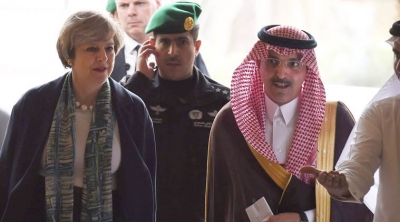Focussing on a female politician’s dress code is sometimes criticised as a distraction but in this case the prime minister’s presentation was integral to the political messaging: Confident, secular Female leader, representing a democracy meets traditional theocratic regime on her own terms.
Michelle Obama similarly eschewed a headscarf on a tour two years ago, so Mrs May isn’t the first visiting dignitary to go without a headscarf, a legal requirement for Muslim women in public places in the Kingdom. But our Prime Minister was on a mission – or more accurately a tightrope; both to win valuable post-Brexit investment for Britain, particularly to launch the flotation of Saudi Aramco on the London Stock Exchange, and to be seen to uphold her own brand of female empowerment, at extreme odds with the culture of her hosts.
Public Relations aside the economic and military relationship between the two countries is already worth so much to both that the Saudi leaders can afford not to take offence at a bare head, which might otherwise seem a provocation. British exports numbered £6.57 billion in 2015 alone. But as well as displaying her ‘feminist’ agenda, Mrs May was also explicit in stating that she would use the trip to make the case for greater gender equality in Saudi Arabia.
It’s a worthy aim and a case that Mrs May, whose sincere commitment to women’s advancement is demonstrable, had to make if she is to carry credibility at home. It may even be that coming from the leader of a respected foreign ally the arguments to allow Saudi women more autonomy over their own lives has some greater traction. But despite there now being a woman (not surprisingly a princess) appointed as the nation’s sports minister who met Mrs May on her tour, the progress toward any significant female emancipation is glacial in a country where every aspect of women’s lives is regulated by men. It hardly suggests that on this aspect of our prime minister’s agenda the Saudi rulers would be a receptive audience.
So, was Mrs May’s positioning not so much ‘empowerment’ dressing to challenge a highly reactionary regime, as window dressing to satisfy a domestic audience appalled by Saudi repression of women? I don’t believe so but, however sincere our prime minister’s convictions, whatever she embodies it is certainly pragmatism. Even if Mrs May’s modernism were to make no impact at all on the Saudi decision makers, she argues that her presence as a role model is some sort of inspiration to women looking for external endorsements in their struggles. That’s not a lot, but it is something.
More worryingly the whole debate about Mrs May’s headgear, or lack of, distracts from the wider context of human rights abuses, both within the Kingdom and resulting from the military activity that Theresa May overtly reprimanded Boris Johnson for accurately describing as Saudi sponsored proxy wars. Not to mention either the contradictory record of a country that professes to support the war on terror but nurtures a seam of Islam that inspires terrorists across the Middle East and way beyond. Taking a position on women’s rights might be bold but its only talk. As far as meaningful action is concerned It doesn’t come close to following the recommendations of two of our own parliamentary committees who have called on the British government to stop licensing arms exports to Saudi Arabia. If a bare head were to deflect coverage away from those issues it would be more than cynical – it would be scandalous.
Jo-Anne Nadler is a Senior Consultant at PLMR, and a former journalist, author and political commentator. Jo-Anne has also previous served as a local Conservative Party Councillor.




